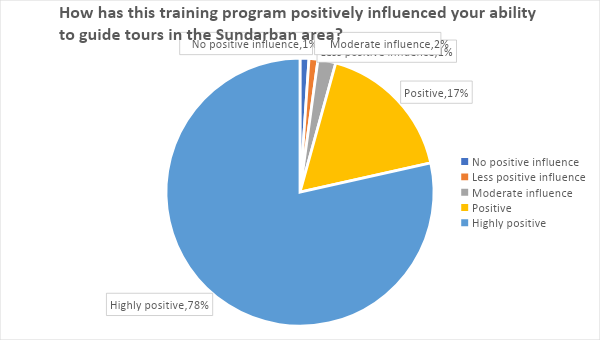Successful EcoGuide Training in the Sundarbans
TOAS gets 100 tour guides trained

Published: 30 Sep 2023
Between September 14th and 21st, an unprecedented training was taking place—100 aspiring EcoGuides gathered in Khulna to learn about the fundamentals of sustainable tourism and deepen their understanding of the ecology of the Sundarbans. This experience empowers them to share the charm of the Sundarbans with the wider world while serving as its guardian.
Why Sundarbans EcoGuide Training
Tourism contributes greatly to Bangladesh’s economy, comprising 4.4% of the nation’s GDP and creating 2.23 million jobs each year. The Sundarbans Reserve Forest (SRF) is among the most important destinations in Bangladesh. It is the largest mangrove forest on Earth, designated as a UNESCO World Heritage Site and Ramsar Site for its outstanding natural and cultural landscape.
While tourism in the Sundarbans generated nearly 40 million BDT in the 2022-23 period, the local population’s living standard is still very low. Some common occupations of the locals include fishery, honey collecting, agriculture, and woodcutting, all of which can have adverse effects on the environment. According to a study conducted by Khulna University, most of the respondents were not satisfied with their current working conditions and 98% were eager to start a new occupation. Only 18%, however, had information about different income-generating activity training offered by NGOs.
The EcoGuide training, developed and implemented by the Bangladesh Ecotourism and Conservation Alliance (BECA) under the USAID Ecotourism Activity, forms part of the solution to the sustainability and workforce issues in the Sundarbans. By strengthening the skills and environmental awareness of local tour guides, the training contributes to a mode of community-based tourism that benefits the Sundarbans and its inhabitants.

Participants engaging in interactive activities during classroom instruction. Source: BECA.
EcoGuide Training Itinerary
The 100 tour guides receiving training were members of the Tour Operators Association of Sundarbans (TOAS) and were selected by the association to participate. The participants were trained in two batches of 50, one batch receiving training from September 14th to 17th and the other from September 18th to 21st. The training consisted of 3 days of classroom instruction and a final field trip to the Sundarbans. On the first day, the participants were trained on the best guiding and storytelling techniques; on the second day, they delved in-depth into the ecology of the Sundarbans, learning to recognize species and the impact of climate change; on the third day, they covered the cultural history of the Sundarbans, tour experience design, and effective ways to incorporate sustainability in guiding. The participants then tried out their learning in a field trip. On the fourth day, they followed the footsteps of the forest goddess Bonbibi and went on a thematic interpretation tour to the Karamjal Ecotourism Center in the Sundarbans. There, they learned about the tiger conservation efforts and the urgent need to save the Sundarbans from climate change. Through this trip, participants deepened their connection with the Sundarbans, appreciating its deep cultural and ecological significance.

Trainees experiencing a thematic interpretation tour on site in the Sundarbans. Source: BECA
Participant Feedback and Results
The training received positive feedback from the participants, many of whom cited it as a beautiful and fulfilling experience. 88% of the participants found the topic of environmental conservation well-explained in the training, 99% responded that they gained hands-on experience, and 100% were impressed by the expertise of the instructors. The training had a positive impact on the participants’ professional development, with 96% claiming that the training improved their ability to guide tours in the Sundarbans.
The participants identified various aspects of the training as the most valuable for them. For some, it was the active peer-to-peer exchange of ideas during group work; for others, it was the experience and cordiality of the trainers; for many, the detailed knowledge of the wildlife in the Sundarbans was absolutely mind-opening.
94% of the participants are confident that they can apply their newly acquired knowledge to their tours. When invited to reflect on how they can guide tours in a sustainable way, many participants offered specific and actionable responses: one guide plans to involve more locals in ecotourism by always having local products on his ship, another will create a clear list of dos and don’ts for tours, and many mentioned educating visitors about using less plastics in the forest.


Future of the EcoGuide Program
The Sundarban Reserved Forest, “the Lungs of Bangladesh,” is both resilient and fragile. It nourishes an amazing array of plants and wildlife and embraces travelers from all over the world. However, we must conserve its natural resources and be sustainable in all development efforts for its beauty to last.
We are truly excited to see how our new EcoGuides will protect the Sundarbans, a green gem of all humankind. Meanwhile, EcoGuide training will continue to train more of the tourism workforce. BECA will offer three upcoming training programs and is working to empower the newly-established destination management organization, Greater Sundarbans EcoTourism Society (GSETS), to operate the training and certification program independently. Please stay tuned for upcoming EcoGuide training sessions by following BECA on Facebook!
Roxana Wang is a fourth-year student at the University of California, Berkeley with an interest in cultural heritage, policy, and international development. She is a Fall 2023 virtual intern at Solimar International, contributing to the USAID Ecotourism Activity project in Bangladesh through research, online marketing, and blog writing.
